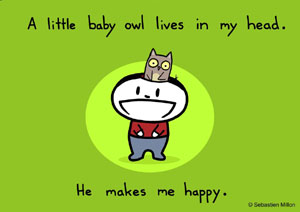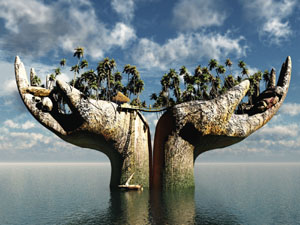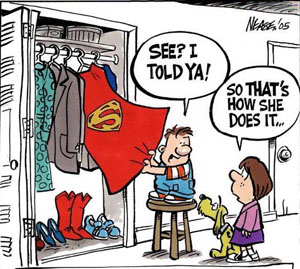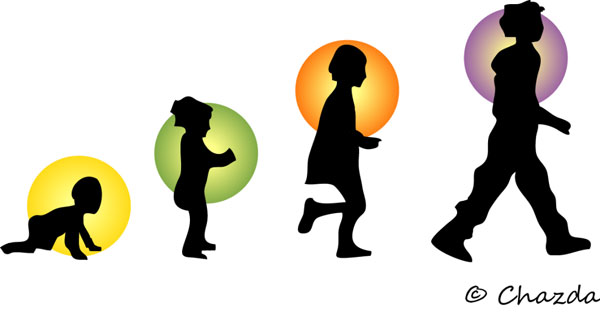Adulthood’s Glory
“You don’t really understand human nature unless you know why a child on a merry-go-round will wave at his parents every time around and why his parents will always wave back.”
– William D. Tammeus, writer
We stand at sunrise. Behold, with that first burst of light, the vastness below. The landscape explodes, it is revealed more brightly than we thought possible. It’s awe inspiring and fills our minds with desire to understand and be a part of it. From this new height the world is profound. Emotions—new, more powerful ones—explode within. For a moment we relish the revealed glories, both inside and out.
Then the growing light reveals the thin spindle of rock on which we stand. It sways as we tremble. We look around, and see the same friends and family, now separated from us, all standing on stronger plateaus. We want to be with them, we want to share in the fun, but we don’t know how. We want to go back to the day before but know that’s impossible. The feelings return, now suddenly threatening, but every attempt at control makes the spindle shake.
According to Kathleen Lee, author, former editor at Parenting and Working Mother magazines, and School-Age Children Expert at AboutParenting.com, “your 7-year-old is developing an understanding about the vastness of the world” while also going through what developmental giant Eric Erikson called Stage Four “Industry vs. Inferiority.” This stage lasts from age 6 – 11 and has been summarized by Alan Wong as “I am what I can achieve…earlier the child could play at activities with little or no attention given to the quality of results. Now, he needs to perform and produce good results!” but often these competing explosions of internal and external worlds make that nearly impossible (Wong, 2011).
I believe God created parenthood so that we would not forget the little things that make life wonderful. As we watch our young children we remember the fun of toys, the endless mysteries of Summer, the joy of play. As we look on age seven we are reminded of the power of our own emotional self-regulation, the sudden thirst for life and the journey of discovery we took in finding our own self-confidence. What some may see as Childhood’s End is truly Adulthood’s Glory; the first sparks which will kindle the very flames of our children’s adult personalities. Though the fire may seem sudden and dangerous, if it is harnessed, it will bring life.
What’s Going on in That Head?!
“Parents can only give good advice or put them on the right paths, but the final forming of a person’s character lies in their own hands.”
– Anne Frank, Child Survivor
 At seven, the child “desires to be perfect and is quite self-critical, worries more and may have low self-confidence,” and this can catch a parent by surprise (GreatKids, 2015). It may feel like one moment we have a happy-go-lucky kid with giggles and dirty knees and the next second we have a different kid who feels so “…insecure about themselves …not getting something to look exactly the way they want it to or losing a game can be crushing to their self-esteem” (Lee, 2012). A child so daring that they make us smile with gritted teeth, hiding our own fear, then clingy. They may be so strong-willed that they yell back louder than we do, while also prone to leaps of insight or empathy that it brings us to tears. Though normal, this ping-pong effect may have some parents wishing to just open up that head and figure out what happened. Okay, let’s do it.
At seven, the child “desires to be perfect and is quite self-critical, worries more and may have low self-confidence,” and this can catch a parent by surprise (GreatKids, 2015). It may feel like one moment we have a happy-go-lucky kid with giggles and dirty knees and the next second we have a different kid who feels so “…insecure about themselves …not getting something to look exactly the way they want it to or losing a game can be crushing to their self-esteem” (Lee, 2012). A child so daring that they make us smile with gritted teeth, hiding our own fear, then clingy. They may be so strong-willed that they yell back louder than we do, while also prone to leaps of insight or empathy that it brings us to tears. Though normal, this ping-pong effect may have some parents wishing to just open up that head and figure out what happened. Okay, let’s do it.
There is “a crucial, well-documented progression” at age seven in which “children consistently develop an explicit understanding of desires before developing an explicit understanding of beliefs” according to a 2012 multi-university study of brain function (Bowman, et al.). The study used EEG machines to compare the desire-belief-understanding mechanism in the brains of adults and 7-8 year olds. This mechanism is the means by which our minds build the bridge between what we want and how to get it—also impacting our understanding of the world and ourselves. For example, we want a chocolate bar. We believe there are chocolate bars in the vending machine. We understand that with the change in our pocket, we can get that chocolate.
 Though Bowman (2012) found that “some adult-like mental processes have already developed, children at this age do not yet robustly” understand how to fulfill their desires with concrete beliefs about themselves or their world. This may be because the ability cannot be accessed because of growing emotional awareness or “masked by children’s less accurate reasoning.” They want the chocolate bar, but aren’t sure how to get it, and if they know that much, don’t know the value of what’s in their pocket or how to use it.
Though Bowman (2012) found that “some adult-like mental processes have already developed, children at this age do not yet robustly” understand how to fulfill their desires with concrete beliefs about themselves or their world. This may be because the ability cannot be accessed because of growing emotional awareness or “masked by children’s less accurate reasoning.” They want the chocolate bar, but aren’t sure how to get it, and if they know that much, don’t know the value of what’s in their pocket or how to use it.
The desire forms in the mind before the ability to fulfill it. How unfair is that?! We’d tantrum, too. Seven year olds may sincerely desire to control their anger or fear or desire to accomplish a new task but just as sincerely not understand how to do it or believe they can. Failure is inevitable, and to add insult to injury, a seven year old is “developing a strong sense of right and wrong, and is more likely to feel guilt and shame” but not let themselves off the hook for their underdeveloped brain (Lee, 2015).
What’s up Out Here?!
“The end of childhood is when things cease to astonish us. When the world seems familiar, when one has got used to existence, one has become an adult.”
– Eugene Ionesco, Playwright
With Erickson, we’re talking social development. Not just what’s going on inside us, but also how we relate to the world, of which a seven year old has just become more aware. In that new awareness is all the astonishing, exciting potential of life and its dangers especially social dangers. As a seven-year old “the attitudes and opinions of others become important.
 The school plays a major role in the resolution of the developmental crisis of initiative versus inferiority” (Wong, 2011). School can be the setting for awesome achievement while becoming a place of judgement for a kid. They will judge themselves most harshly on their grades, they will compare themselves to their peers and try to puzzle out why they are different—and who’s different is better. They will strive to perform, not just for praise, but now for fear of underperforming. All the while there is this glorious thirst for knowledge about the bigger world and hunger to make their place in it. All kids will wrestle with Industry vs. Inferiority, most will come out on the other side confident, excited pre-teens.
The school plays a major role in the resolution of the developmental crisis of initiative versus inferiority” (Wong, 2011). School can be the setting for awesome achievement while becoming a place of judgement for a kid. They will judge themselves most harshly on their grades, they will compare themselves to their peers and try to puzzle out why they are different—and who’s different is better. They will strive to perform, not just for praise, but now for fear of underperforming. All the while there is this glorious thirst for knowledge about the bigger world and hunger to make their place in it. All kids will wrestle with Industry vs. Inferiority, most will come out on the other side confident, excited pre-teens.
Parenting is Developmental, Too
“Fathering is not something perfect men do, but something that perfects the man. The end product of child raising is not the child but the parent.”
– Frank Pittman, Psychiatrist and Author
We stand at sunrise. It is our choice as parents to turn our backs on the coming glory and look to the retreating night in fear or rejection. It’s tempting. “Children this age can often veer between wanting to accomplish tasks” by themselves, Lee said, or “just as quickly ask an adult to help” (2015). It is tempting to be mad at that tug-of-war ourselves, throw up our hands at the irrationality and just let go.
 We must remember that this is a developmental stage, same as toddlerhood, but now that our kids can use words—sometimes in amazing ways—we are fooled into thinking they are rational people. Not yet, but it’s coming. Our faith in them as they tremble on their spindle of insight is their strength. Our faith in ourselves as parenting just another developmental stage, like the ones we’ve succeeded in prior, will help them feel normal as they desperately compare themselves to others. Our faith in the awesome young people that they are—since the emotionality, inferiority and defiance are just growing pains—will help them become their best selves, not over-focus on the negative.
We must remember that this is a developmental stage, same as toddlerhood, but now that our kids can use words—sometimes in amazing ways—we are fooled into thinking they are rational people. Not yet, but it’s coming. Our faith in them as they tremble on their spindle of insight is their strength. Our faith in ourselves as parenting just another developmental stage, like the ones we’ve succeeded in prior, will help them feel normal as they desperately compare themselves to others. Our faith in the awesome young people that they are—since the emotionality, inferiority and defiance are just growing pains—will help them become their best selves, not over-focus on the negative.
Wong (2011) and Lee (2015) both urge parents to create a family “spirit of excellence” that fosters self-comparison and being your best rather than other-comparison while “offering frequent encouragement and helping a child focus on what she might learn from an activity rather than what didn’t go right.” The GreatKids professionals suggest to “take advantage of” your awesome seven year old’s “eagerness to learn by asking open-ended, thought-provoking questions, doing puzzles, and playing thinking games. Initiate discussions about right vs. wrong and provide opportunities for independent decision-making” (2015).
One of the best way to blend these routines together is to debrief after a joyful, angry or sad moment, once the emotions are calm. We can learn amazing things about our seven year old’s mind and heart which encourage us, while also providing the vital opportunity to foster self-awareness, teach self-regulation, and reframing comparison and condemnation to self-competition and self-forgiving learning.
 As parents, we need to grow, too. “As a 7-year-old’s world increasingly opens up” Lee advised, “he will rely more on things he can expect and count on, such as family time, a bedtime routine, and regular family meals” (2015). But that doesn’t mean we should keep the same routines from birth to six years. Our routines, our parenting and our own social networks need to develop alongside our children’s.
As parents, we need to grow, too. “As a 7-year-old’s world increasingly opens up” Lee advised, “he will rely more on things he can expect and count on, such as family time, a bedtime routine, and regular family meals” (2015). But that doesn’t mean we should keep the same routines from birth to six years. Our routines, our parenting and our own social networks need to develop alongside our children’s.
We may include teachers, guidance counselors or coaches into our email chains—it’s awesome to have these people as partners, use them! They can help us calm ourselves, provide advice, or suggest more professional aid if it is ever warranted. Family meetings, debriefings or sit-down chats may become common. We may need to tolerate back-talk in the moment, to get to real talk once the emotions settle. On the other side we will find a kid who’s beating themselves up harder than we are and so much cooler than either of us thought when we were upset. We are parents, we set the tone and structure that our kids need to thrive; not just in authority, in empathy as well. It is our power when we, too, feel powerless.
We stand at sunrise, not Childhood’s End at Adulthood’s Glory. Be ready. Be calm. Be excited. Because it’s awesome.
__________________________________________________
Bowman, L., Liu, D., Meltzoff, A., Wellman, H. (2012) Neural correlates of belief- and desire-reasoning in 7- and 8-year-old children: an event-related potential study. Developmental Science. Retrieved from: http://pages.ucsd.edu/~davidliu/papers/BowmanLiu2012.pdf
GreatKids (2015) Developmental milestones: Your 7-year-old child. GreatSchools.com. Retrieved from: http://www.greatschools.org/gk/articles/developmental-milestones-your-7-year-old-child/
Lee, K. (2012) Your 7 Year Old Child: Emotional Development. About Parenting. Retrieved from: http://childparenting.about.com/od/physicalemotionalgrowth/a/7-Year-Old-Child-Emotional-Development.htm
Wong, A. (2011) Erik Erikson’s Stages: Applied…VTaide.com. Retrieved from: http://www.vtaide.com/blessing/ERIK4.htm



